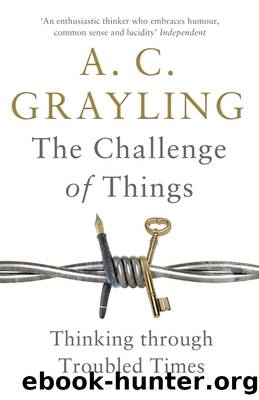Challenge of Things : Thinking Through Troubled Times (9781408864630) by Grayling A. C

Author:Grayling, A. C. [Grayling, A. C.]
Language: eng
Format: epub
ISBN: 9781408864630
Publisher: Bloomsbury
Published: 2015-09-15T05:00:00+00:00
Does Government Know Best?
We are required by law to wear seatbelts in cars and crash-helmets on motorbikes, to refrain from smoking in public indoor areas, from injecting heroin and smoking marijuana â all in the interests of our health, our well-being and our safety. Such laws imply that government knows our interests better than we ourselves do, and has a duty to act accordingly. Given that government has the information, the experts, the commissions of enquiry, the ministries with teams of civil servants and special advisers and their responsibilities, could this be right?
What is at stake in this question? The answer is â liberty. When the authors of the Federalist Papers were debating whether to add a Bill of Rights to the then new United States Constitution, Alexander Hamilton objected that drawing up a list of positive rights would imply that they were the only ones to which citizens were entitled, whereas the absence of prohibition left open the whole field of what Isaiah Berlin later called ânegative libertiesâ, defined as absence of constraint. Pertinently, Berlin declared himself wary of âpositive libertiesâ â those permitted or (worse) enjoined constitutionally or by statute â on the grounds that they are in the interests, as decided by those who know best, of those destined to enjoy them.
Once our legislators are endowed with the power to decide what is in our interests, it is not long before they begin to exercise it. We think it is a joke to say that sugar will soon be the new heroin, to be proscribed as injurious to health â but laws on the size of soda drink bottles in New York (a way of limiting corn syrup intake by the American obese) are a staging post on the way thither. It is accordingly important to distinguish between laws that require information about the content of foodstuffs â stating how much fat and sugar they contain â and laws that (might one day) ban sugar, because the former provide people with information on which they can choose for themselves how to act, whereas the latter embody the principle that nanny â the drafter of the relevant laws â knows best.
There is a difficult line to be trodden here, of course. Through its representatives in government a community might make rational decisions to do certain things that limit individual freedoms in the interests of all â such as requiring everyone to drive on the same side of the road, and not to do it under the influence of mind-altering substances like heroin and alcohol â but the temptation to paternalism and condescension in the form of other less evidently publicly beneficial laws that prohibit this or that behaviour because it is not in the interests of individuals to engage in it â the drug laws are a prime example â is another matter. The line in question is now regularly and in large strides overstepped by governments of all stripes, not least because of the passivity with which such tramplings on individual liberty are received by the trampled.
Download
This site does not store any files on its server. We only index and link to content provided by other sites. Please contact the content providers to delete copyright contents if any and email us, we'll remove relevant links or contents immediately.
| Archaeology | Essays |
| Historical Geography | Historical Maps |
| Historiography | Reference |
| Study & Teaching |
Underground: A Human History of the Worlds Beneath Our Feet by Will Hunt(12085)
Sapiens by Yuval Noah Harari(5363)
Navigation and Map Reading by K Andrew(5150)
The Sympathizer by Viet Thanh Nguyen(4384)
Barron's AP Biology by Goldberg M.S. Deborah T(4141)
5 Steps to a 5 AP U.S. History, 2010-2011 Edition (5 Steps to a 5 on the Advanced Placement Examinations Series) by Armstrong Stephen(3723)
Three Women by Lisa Taddeo(3422)
Water by Ian Miller(3177)
The Comedians: Drunks, Thieves, Scoundrels, and the History of American Comedy by Nesteroff Kliph(3066)
Drugs Unlimited by Mike Power(2590)
A Short History of Drunkenness by Forsyth Mark(2286)
DarkMarket by Misha Glenny(2206)
And the Band Played On by Randy Shilts(2197)
The House of Government by Slezkine Yuri(2190)
The Library Book by Susan Orlean(2064)
Revived (Cat Patrick) by Cat Patrick(1987)
The Woman Who Smashed Codes by Jason Fagone(1967)
The Absolutely True Diary of a Part-Time Indian by Sherman Alexie(1901)
Birth by Tina Cassidy(1901)
